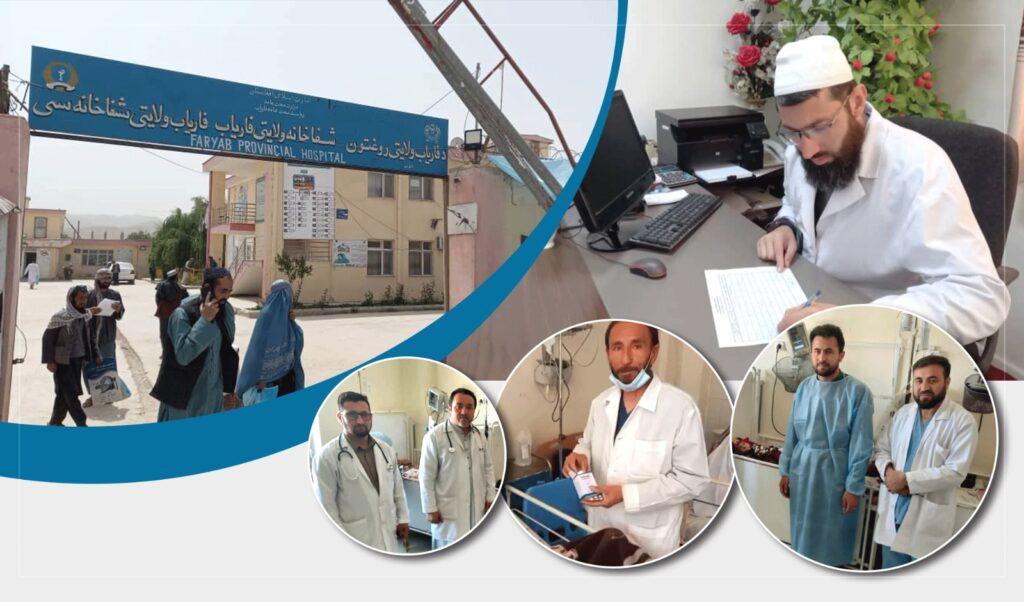
Provincial Hospital Lacks Medicines: Faryab Residents
MAIMANA (Pajhwok): Some residents in northern Faryab province have been complaining about a shortage of medicines in the provincial hospital and urge officials to pay serious attention to resolving this problem.
They complain about economic problems and their inability to buy medicines from private pharmacies.
Jamaluddin, a resident of Ghormach district of Badghis province, said he admitted his father to the hospital in Maimana city and bought all medicines he needed from the market except for one ampoule. He had so far bought medicines worth 5,500afs.
He explained if he had financial means, he would not have visited this hospital. He asked the Islamic Emirate to provide medicines to patients for free, taking into account their economic problems.
Noorullah, a resident of Lolash district of Faryab, has a heart condition. He said he has been hospitalized in the Maimana hospital since more than a week. Doctors are taking care of his examinations, but there is no medicine.
“My financial position is weak, so I didn't go to a private hospital, I thought that services and medicines in the government hospital were free, but there is nothing here, they only gave me a packet of tablets, but I bought medicines from the market for 6,000afs”.
Charity foundations should cooperate with the Afghan Ministry of Public Health in this area because most people cannot afford to buy medicines, District Chief Mullah Abdul Jalil said.
Faryab health officials
Dr. Mohammad Ibrahim Karimi, chief physician at Maimana city hospital, confirmed the shortage of medicines and said the hospital included internal medicine, surgery, pediatrics, obstetrics, polyclinic and emergency department and had 100 beds.
According to him, the provincial hospital's budget, the Health Emergency Response Project (HER), is for 100 beds, and medicines and equipment provided are not enough for Faryab's two million population.
Maulvi Khan Agha Asad, deputy head and acting public health director of the province, explained such problems not only plagued raised the provincial hospital, but all health centers in Maimana city and districts.
Faryab is the second largest province in the north and northeast of the country with a population of more than two million people. The establishment of a provincial hospital and health services, which is planned by a contracted NGO and a donor, is for 100 beds, while up to 300 patients from Faryab and two districts of Badghis province visit this hospital for treatment daily.
“The failure of the NGO (SAF) and the United Nations International Children's Emergency Fund (UNICEF) to deliver promised medicines has also led to complaints that both organizations have problems with each other, but they blame each other”
The hospital up-gradation to a 300-bed facility has been approved by MoPH, while there is staffing and space capacity, but UNICEF does not accept its budget. If 300 beds are included in the UNICEF program, there will be no problem in the health sector.
Solidarity of Afghan Families Organization in Faryab (SAF)
Dr. Ibrahim Khel, head of SAF, explained health services are provided in accordance with BPHS and EPHS policies of MoPH through 66 health centers and 547 health posts under the name HER or (Health Emergency Response). A total of 950 personnel, including 584 men and 366 women, are working, and the contract for this project has been signed with UNICEF office.
“The current project is HER project, which has budget constraints due to the health project contracts, and medicines for a number of diseases that are not included in the list are not stocked in health centers for this purpose”
The contract for the Maimana Provincial Hospital is for 100 beds, but currently 250 beds are active, and according to EPHS policy, the minimum number of employees should be 101 and the maximum 161, while 202 employees work at the provincial hospital and on average more than 157,400 patients are treated on an outpatient basis every month, he added.
“Based on the contract, 100 items of medicines will be distributed by UNICEF and 40 items of medical supplies by the implementing agency (SAF) to health centers. We receive medicines from UNICEF on a quarterly basis and distribute them to health centers. UNICEF purchases these medicines from national markets, which must have quality control certificates, but sometimes the number of items does not match the suppliers, which is why there are sometimes delays in the supply of medicines”.
Pajhwok journalist shared the issue with Mohammad Dawood Royan, head of the UNICEF office in the relevant department, but did not receive a response after about ten days.
hz/ma

Legal Disclaimer:
MENAFN provides the
information “as is” without warranty of any kind. We do not accept
any responsibility or liability for the accuracy, content, images,
videos, licenses, completeness, legality, or reliability of the information
contained in this article. If you have any complaints or copyright
issues related to this article, kindly contact the provider above.
Most popular stories
Market Research

- B2PRIME Appoints Former Onezero Sales Head Stuart Brock As Institutional Business Development Manager
- B2broker Receives“Best Liquidity Provider” Award At Forex Traders Summit Dubai 2025
- Variational Announces $1.5 Million Strategic Round And Launches Referral Program
- Edgen Launches AI Super App, Democratizing Institutional-Grade Crypto Market Intelligence
- Yala Brings Cross-Chain Bitcoin Liquidity To Solana
- From Private Equity To Public: Trace ASI's AI For Crypto Hits 87% Success Rate





















Comments
No comment